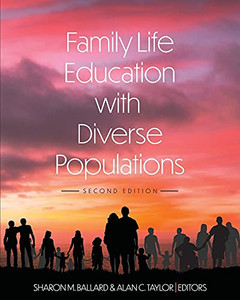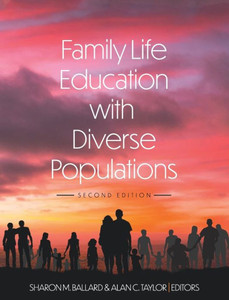
Family Life Education: Principles and Practices for Effective Outreach, Third Edition helps students and field professionals develop the knowledge and skills needed to take family science principles to citizens where they live and work via family life education programs. The authors incorporate leading outreach scholarship with years of professional experience, providing a scholarly yet practical guide for current and future family life outreach professionals. Opening chapters lay the foundation, discussing the philosophical underpinnings of family life education and encouraging readers to develop their own outreach philosophy. Subsequent chapters help readers learn principles and methods for reaching out to the public and assist readers in learning principles and practices for reaching diverse audiences, forming and using community collaborations, navigating the social marketing of programs, and discussing means of improving the practice of family life education. In all, the authors provide a comprehensive, scholarly, yet practical how-to text that should prove to be the ultimate introductory resource on effective family life education. The revised book is organized into five sections and 19 chapters, including one new chapter, followed by an Appendix. The first section, Foundations of Family Life Education, lays the foundation for effective outreach work by discussing the historical and philosophical underpinnings of current outreach family life education, guiding readers to develop their own FLE philosophy and role as an FLE. The second section, Development of Family Life Education Programs, includes chapters which present an integrated framework for developing comprehensive prevention programs and approaches for evaluating such programs. The third section, Implementing Family Life Education Programs, includes several chapters to help readers learn principles and methods for teaching the lay audience, including designing effective instruction, engaging an audience, teaching skills and tools, and working with diverse audiences. The fourth section, Content and Contexts for Family Life Education, includes four content chapters on education for personal well-being, marriage and relationship education, parenting education, and sexuality education. It also adds three additional contexts chapters detailing how to do family life education in settings other than traditional workshop teaching, such as using internet technology, traditional and social networking media, and writing for the lay audience. The final section, Promoting, Marketing, and Sustaining FLE Programs, contains chapters to assist the reader to learn principles and practices for forming effective collaborations and marketing family life principles, practices, and programs. The book concludes with a Narratives of Family Life Educators chapter, providing a window into family life education through the experience of several currently practicing FLEs, a new chapter on mentoring, titled Helping Others Find their Place in Family Life Education, and an epilogue chapter, designed to highlight the needs of future research and practice in family life education. Each chapter includes an Explorations section at the end, designed as a real-life application of the chapter material.
- | Author: Stephen (Steve) F. Duncan|H. (Harold) Wallace Goddard
- | Publisher: Sage
- | Publication Date: May 26, 2016
- | Number of Pages: 464 pages
- | Language: English
- | Binding: Misc. Supplies
- | ISBN-10: B07DNMXZ3Z
- | ISBN-13: 9781483384573
- Author:
- Stephen (Steve) F. Duncan|H. (Harold) Wallace Goddard
- Publisher:
- Sage
- Publication Date:
- May 26, 2016
- Number of pages:
- 464 pages
- Language:
- English
- Binding:
- Misc. Supplies
- ISBN-10:
- B07DNMXZ3Z
- ISBN-13:
- 9781483384573





